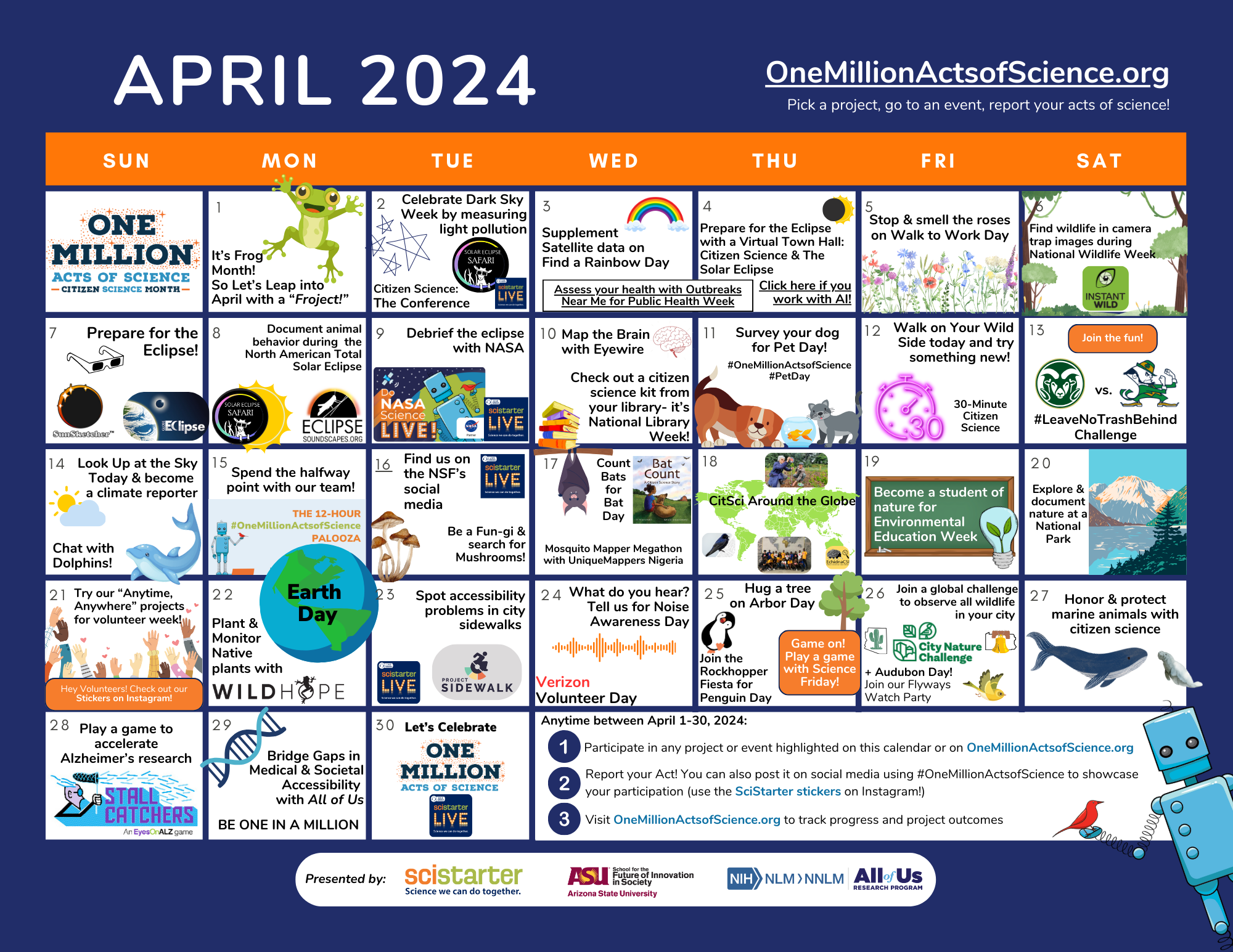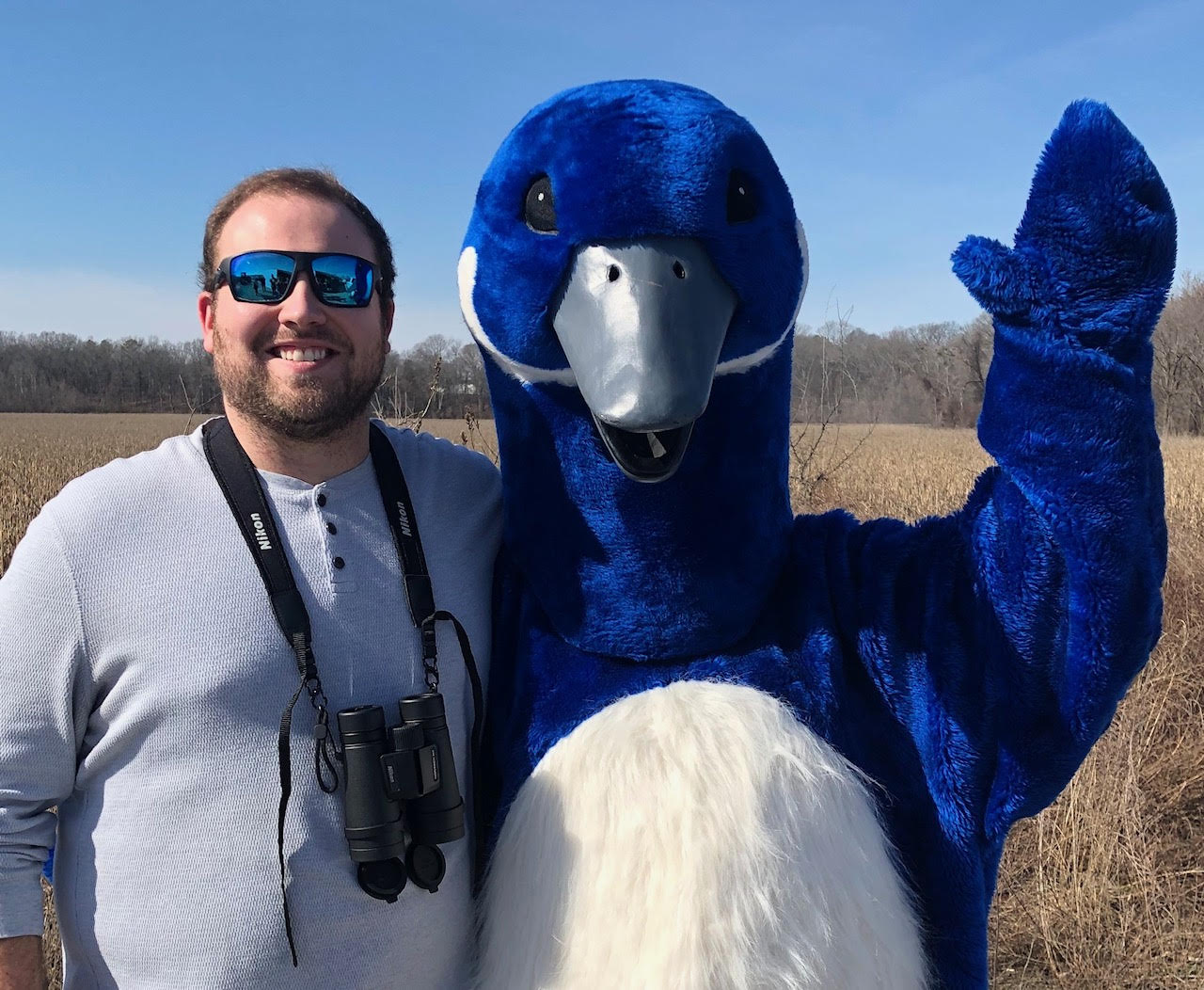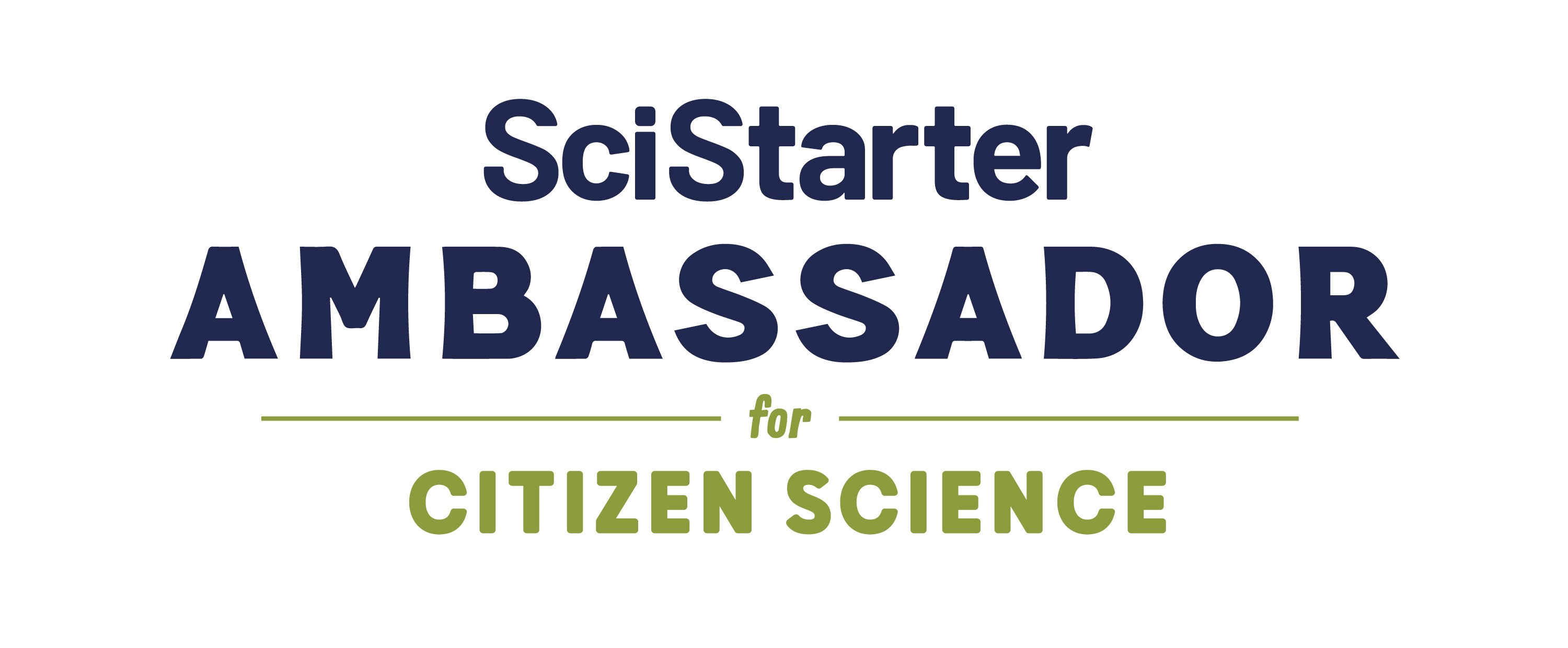Half a million volunteers from 126 countries contributed more than One Million Acts of Science through nearly 1,000 scientific research projects and events in April.
On behalf of SciStarter, all of our partners, and the sponsors of Citizen Science Month, we thank each and every participant.
Citizen Science Month 2024 was coordinated by SciStarter and Arizona State University, with support from the National Library of Medicine within the National Institutes of Health and Department of Health and Human Services, under Cooperative Agreement Number 5U24LM014070 with the University of Iowa, Harding Library for the Health Sciences, and University of Pittsburgh, Health Sciences Library System.

Citizen Science Month 2024 exceeded our expectations due in large part to the involvement of libraries and other community-based organizations that hosted more than 30% of the 250 events in April (twice as many as in 2023).
These events ranged from online trainings that helped people discover ways they can engage in scientific research, to hands-on data collection and analysis, to weekend-long events that took people outside to document observations of nature.
In addition to events, volunteers engaged in projects listed on SciStarter.org, from astronomy to zoology, to help accelerate scientific research.
By April 24, 2024, volunteers around the world amassed One Million Acts of Science. A total of 1.129 million Acts were tallied at the end of the month.
One third of participants joined TWO or MORE projects or events during Citizen Science Month!

Close to one-third of the Acts came through SciStarter Affiliate projects. (Among the more than 1,000 participatory science projects listed on SciStarter.org, several hundred are Affiliates, which use digital tools to help participants track their contributions across projects on their SciStarter dashboards.)
Social media played a crucial role in broadening awareness of Citizen Science Month and the opportunities for anyone, anywhere to participate in research. Posts were shared to more than 23 million social media followers.
Follow us!
Facebook | Instagram | TikTok | LinkedIn | YouTube
More than 1,300 posts used the #OneMillionActsofScience hashtag and were viewed more than 1.9 million times, showcasing the extensive reach and influence of the initiative.
SciStarter reached hundreds of thousands of people during April through our website and emails alone. Individuals tuned into Citizen Science Month Zoom and YouTube events more than 16,000 times in April (five times more than in 2023).
Stories from the Field
Here’s a representative sampling of the people and projects behind the data.
The One Millionth Act of Science was completed by Coty Briley, an educator from Tennessee, who participated in Project FeederWatch on April 24. Briley now uses his enthusiasm and knowledge to coach fellow educators on citizen science as part of their professional development!

Sarah Tribelhorn, a librarian at San Diego State University, partnered up with the Green Team student group to create a set of hands-on workshops with students who learned about the All of Us Research Program from the NIH (an effort to enlist one million volunteers from communities underrepresented in biomedical research to improve health solutions), cleaned up their campus via the Litter Journal project, and participated in the City Nature Challenge with iNaturalist.
SciStarter also hosted impactful All of Us dialogues and events with libraries in California, Wisconsin, Florida, and Pennsylvania, as well as an online dialogue with nearly 4,000 registrants on Zoom! Nearly 2,000 people also enjoyed All of Us talks in Spanish.
Kelly March, a youth services librarian in New York, organized monthly meetups to fully prepare community members to engage in citizen science during the April 8 total solar eclipse. Together, they documented changes in animal and plant behavior, measured the size of the sun, and recorded noise levels during the eclipse.
In Nigeria, more than 100 volunteers from Unique Mappers helped government and international humanitarian organizations respond to vulnerable flood communities by filling in data gaps using Open Map Data. This effort resulted in 19,000 Acts of Science in April!
Marianne Barrier, lead project scientist of Monkey Health Explorer (a citizen science project on Zooniverse), created a 30-Day Cell-a-thon to challenge volunteers to help complete workflows by identifying cells in images of monkey blood smears, resulting in more than 24,000 data classifications!
Girl Scouts Overseas organized a virtual month long event for Girl Scouts living overseas to get involved with Stall Catchers, a project that helps accelerate Alzheimer’s disease research by classifying online images. Girl Scouts in Spain, UK, American Samoa, Japan, and Germany annotated more than 1,000 online images!
Nearly 80,000 reports on weather and precipitation were submitted through CoRoRaHS in April, and more than 200,000 reports were logged by the USGS through its “Did You Feel It?” earthquake reporting app.
On April 8, millions of people gathered to watch as the moon completely eclipsed the sun, casting the sky into an eerie darkness. Citizen scientists enthusiastically participated, submitting over 87,000 observations to SunSketcher, the fourth most popular SciStarter project in April 2024.
Volunteers at Verizon Wireless, a corporate social responsibility partner, dedicated 644 volunteer hours across 20 projects during the month of April.
Platforms including Zooniverse and CitSci.org, along with many project leaders around the world, leveraged “One Million Acts of Science” to inspire their participants to reengage in projects toward the collective goal of One Million Acts! During the SciStarter-Zooniverse 12-hour Palooza, for example, 42,323 Acts of Science were tallied, advancing research on animals, space, health, and the environment!
NPR/Science Friday, Discover Magazine, CNN, AARP magazine, and other media outlets brought in new audiences who are now part of the SciStarter community. Science Friday, for example, used this opportunity to communicate lessons on neuroscience to their viewers, highlighting brain science projects Neureka and Stall Catchers, and the Online Memory Training Study in a “Hack Your Brain” webinar.
These and many other event recordings are posted on SciStarter’s YouTube channel.
Evaluation Outcomes
Evaluation was conducted by Arizona State University’s College Research and Evaluation Services Team (CREST). Here’s what they found:
94% of survey respondents rated the events and activities as “excellent” or “good.” 96% would recommend activities to others, and 100% expressed a likelihood or extreme likelihood to engage in more citizen science projects in the future.
A major motivation to participate was described as “curiosity and a desire to learn” about things they care about. Following their participation, all respondents (100%) agreed or strongly agreed that science is enriched by the inclusion of diverse perspectives and that they also “benefit from participating in citizen science.”
After participating in Citizen Science Month activities, 91% of survey respondents reported gains in confidence in collecting or analyzing data. 89% reported gains in confidence discussing scientific topics with friends and family.
93% of respondents strongly agreed or agreed with the statement “My involvement, even if small, did make an impact on a larger project,” and more than half of the respondents (62%) said they planned to share their citizen science experiences with others. See the full report here.

Planning Is Underway for 2025
Librarians, museum professionals, troop leaders, educators, community organizers, and other facilitators are invited to join us on Zoom on October 22, 2024 for Jump Start your Planning for Citizen Science Month 2025! Register for free here.
New for 2025: SciStarter Ambassadors!

The SciStarter Ambassador program, made possible with support from the Institute for Museum and Library Services (IMLS) and the Gordon and Betty Moore Foundation, provides free training, professionally designed materials, and more to help volunteers become champions, connectors, and facilitators of citizen science in libraries. Hundreds of certified Ambassadors will be available to support events and programs during Citizen Science Month in April 2025!

What you want to see happen next matters to us, and we’d love to hear from you. Reach out to us at info@scistarter.org.
Here’s to another year of discovery, collaboration, and millions of Acts of Science!
Join the International Citizen and Community Science Library Network
Tell us your interest in participating as a facilitator in April 2025
Citizen Science Month 2024 is presented by SciStarter and Arizona State University, and funded by the National Library of Medicine, National Institutes of Health, and Department of Health and Human Services (HHS), under Cooperative Agreement Number U24LM014070 with the University of Iowa, Harding Library for the Health Sciences, and University of Pittsburgh, Health Sciences Library System. All of Us is a registered service mark of the U.S. Department of Health and Human Services. Citizen Science Month only exists with the help of many partners across the globe. For more information on our partners, visit our website.

